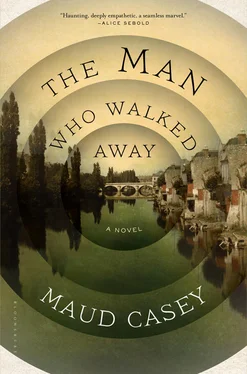It is clear Albert doesn’t like to speak of his father, and the Doctor knows not to rush him. There will be time enough , the Doctor’s own father said once. But the incompetent country doctor — his unbuttoned cuffs flapping frantically as he leeched his father until there was no more blood left to take — forbade him to enter the room. That he was sixteen and not a child made no difference to the country doctor, who thought of him only as a nuisance, a thing underfoot. Still, he snuck into his father’s room where he lay ill and alone, in a rare moment of stillness. He reached out to touch his father’s face, and into the stillness came a great flapping, a hundred little birds descending, the incompetent country doctor’s flailing cuffs, driving him from the room. With the foolish indignance of youth he fled his home, abandoning his father to death and a lonely grave. Later he would vow to become a doctor better than the one who ran him out of his home forever. He is certain he could have saved them both — his mother and father — if only they’d waited to become ill until he became a doctor, until he could save them. What did he know of medicine? Not enough, but this man’s anguish is familiar.
“Albert, let’s go out into the courtyard. Let’s get some air.”
“There, there, there.” The song of Nurse Anne’s voice comforting someone cuts through the shadows of the hall as they make their way out to the courtyard.
“I think I have met her before,” Albert says. “Nurse Anne.”
“We all feel that way,” the Doctor says. But then he realizes: If you can’t remember your life, to find someone familiar is fraught. Who knows what may have happened — what you might have done or said — when you encountered them before? It is the problem of a life in pieces.
“You met her here, Albert,” the Doctor says definitively. “For the first time.” And he sees Albert’s body relax.
The clouds are gone and the remnants of late afternoon light fill the courtyard as Walter explains something to Marian through her veil and Nurse Anne whispers something to the veteran, who circles the hole in the garden. He stops when he sees Albert. “There he is with his clean feet,” he says. “Why do you wash his feet and not mine?”
“Why do you listen at doors when you should be minding your own business?” Nurse Anne says.
“Then there is nothing to be done here,” the veteran says, peering into the hole as if it went straight to the center of the earth. “It is too late.”
“What I am wondering. .” Walter says to Marian. “What I’m wondering is if the woman who claimed to be my so-called wife was the representation and the woman in the painting was real. That’s all I’m asking. It’s not so much. I’m sorry the nerves of morally deprived men such as myself are blackened and you have to smell them burning.”
“Those are the mushrooms burning,” Marian says. “Walter, I have other concerns. Hello, Albert.”
“Hello, Marian,” Albert says cautiously.
“A friend?” the Doctor asks.
“I wouldn’t be so bold as to say that,” Albert says.
“Well, she didn’t say hello to me. She doesn’t say hello to just anyone,” says the Doctor, putting an arm through Albert’s and leading him down the path, the birch trees looming over them.
“The clouds are gone,” Albert says.
It’s true. The air is clear, and full of the possibility of spring. Each of Albert’s journeys must have seemed full of possibility, the Doctor thinks. What must it have been like to set off again and again and again? To disappear and then reappear — into what? He looks over to see if that look in Albert’s eyes is still there — the suggestion that something might come whirring around the bend at any moment.
“What was it like, Albert? To walk? To walk so far?”
“Everything was. . funny,” Albert says, ducking to avoid a low-hanging branch. “The trees took fantastic shapes.”
“It sounds. .” But the Doctor isn’t sure how to finish the sentence, and he is a man accustomed to finishing his sentences. There is something curious about this man, his funny big ears, and his lost life. It is difficult to know the truth when someone professes oblivion.
“We don’t have to talk,” says the Doctor. There is a train in the distance and the memory of his recent train ride rumbles through his body.
“It was astonishing,” Albert says, and for a moment, standing there in the courtyard with the train’s whistle fading into the distance, the truth is beside the point.
On his way home, the Doctor decides to go for a short ride around the lake of the public garden. “Supraorbital foramen.” There is this. “Foramen, foramen, foramen.” There is that, and in goes another gnat, down his throat. Click: He is his skeleton. Click: He is his muscle. Click: He is his blood circulating. Click goes the crank on the magnificent bicycle as it propels him through the world. This sort of movement is astonishing. He may not know exactly how Albert felt when he walked and walked and walked, but he knows the wonder of this.
“Lacrimal,” he whispers. “Lacrimal, lacrimal, lacrimal.” He rides past the fir trees — as it grows dark, they are rather fantastically shaped — around the lake, where the geese are battling with the ducks — everything is a little funny — concentrating on the rhythm of the bicycle, moving his ankles to the machine’s music. Always pedal vigorously , instructed the book he bought to teach himself how to ride properly. The cyclist is a man made half of flesh and half of steel that only our century of science and iron could have spawned.
The rag merchant packing up his cart waves: “You’re out late, aren’t you?” The bicycle quivers— Look ten meters in front of you and never look at the road , and what does he do? He looks directly at the road and nearly runs into a tree. When he manages to right himself, he shuts his eyes, erasing the difference between the dark outside and the dark inside, feeling the same excitement as when he held his parents’ hands as they waited for the great Léotard to come whirring into town. It’s as though he is on the verge of knowing the correct time of his father’s death; as though it is about to reveal itself to him, falling into place like a tumbler lock.
So fierce is his certainty, he almost expects to see the great Léotard when he opens his eyes. Instead, out of the evening mist steps a man who— How could it be? The same strange face, those expectant, sad eyes, oblivious to everything except putting one foot in front of the other; he looks just like Albert. Someone comes . The man is so fixated he doesn’t notice the Doctor bearing down on him and the Doctor is forced to veer off the path, squealing to a halt just before a hedge of prickly gorse bushes, somersaulting over the handlebars, not at all in the style of the great Léotard.
As he flies through the air, his father’s watch slips from his pants pocket and a voice— his voice! — cries out, “Papa!” But he doesn’t have time to be embarrassed at having cried out like a child; his only concern is finding the watch that has marked the minutes of his life. As soon as he hits the ground, he is scrambling to his feet again, diving headfirst back into the same prickly bush he spends every morning so carefully avoiding. Though he searches and searches, the watch is nowhere to be found until, in despair, he looks once more and there it is, shining up at him through the thick brambles. There are long scratches on his arms, his waistcoat is torn, and his cravat is in an unruly state, but he does not care.
Ignoring his dishevelment, he looks for Albert on the path, but he is nowhere to be found. The man is not Albert at all; instead he is a shadow on the other side of the path, waving his fist. “Are you blind?” the man shouts as the Doctor jumps on his bicycle and pedals quickly away into the night. It is his greatest fear: That he won’t see past the familiar, that his eyes won’t become new. That he won’t see Albert at all.
Читать дальше












